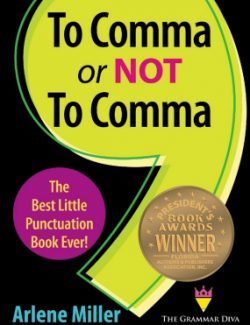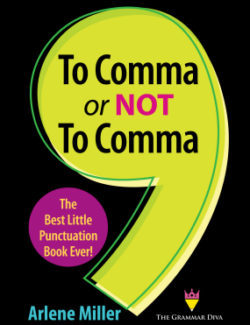Arlene Miller's Blog, page 28
August 28, 2020
A New “Nym” for You!
 Image by Christian Dorn from Pixabay
Image by Christian Dorn from PixabaySynonym. Antonym. Homonym. We have all heard of these. And maybe you have heard of this one, but frankly I hadn’t: contronym.
But wait! When I started to research this post, I discovered that there are boatloads of words that end in –nym, which looks like, sounds like, and means name. Ah, there’s one! Pseudonym (false name or pen name).
Anyhow, I guess if you are a champion Scrabble player, you might know many words that end in –nym, but I guess I never really thought about it. When I taught seventh grade English, one of the most fun things we did was study Greek and Latin roots. Most of them were actually prefixes. I would put a few on the board (this is back before tech took over), and the students listed all the words they cold think of with that prefix or root (and we did a few suffixes). But -nym, for some reason, wasn’t on my list. We studied pseudo (pseudonym), anti (antonym), homo (homonym — and yes, the kids did twitter about that one, since they were twelve ), syn (synonym), and contr (contronym), but not –nym.
And now, since I discovered that there are boatloads of strange words that end in –nym, I will have to talk about them in future posts. But for today:
Synonym – Why you need a Thesaurus. Syn means same or together. We all know what synonyms are, and writers need them! Mad, angry, irate, furious are all synonyms.
Antonym -The opposite of synonym. Anti means against, so these words are opposites. Old and young, hot and cold, dark and light, etc.
Homonym – Words that sound the same and are spelled the same, but have different meanings. Wait! Then what is a homophone? Words that sound the same, but are spelled differently and have different meanings. Many times, the distinction is not made, and they are all called homonyms. But technically —
Homophones: bare/bear, board/bored, clothes/close, bizarre/bazaar
Homonyms: train (to teach)/train (a locomotive), play (something acted on a stage)/play (to have fun)
We already mentioned the common word pseudonym. Another common one is acronym. An acronym consists of initials of something that then is pronounced as its own word: NASA and NATO are examples.
Contr/contra means opposite (contrary, controversy). So a contronym is a word that has two opposing meanings. Here are some examples:
Bolt: To secure–or to flee
Bound: Heading somewhere–or restrained from movement
Cleave: To adhere to -or to separate from
Dollop: A large amount (British English)–or a small amount
Fast: Quick–or stuck
Finished: Completed–or destroyed
First degree: Most severe (murder charge)–or least severe (a burn)
Fix: To repair–or to castrate
Hold up: To support–or to get in the way of
Left: Remained–or departed
Out: Visible (stars)–or invisible (lights)
Overlook: To supervise–or to neglect
Rent: To purchase use of something–or to sell use
Rock: An immobile mass of stone –or a shaking movement
Sanction: To approve–or to boycott
Seed: To sow seeds–or to remove them
Skinned: Covered with skin–or with the skin removed
Strike: To hit–or to miss in an attempt to hit
Throw out: To dispose of–or to present for consideration
Trim: To decorate–or to remove excess from
Trip: A journey–or a stumble
Wear: To endure– or to deteriorate
Wind up: To end–or to start up
A little more obscure than synonyms and antonyms, huh?
And a little like oxymorons.
Stay safe. Wear a mask.
August 21, 2020
An “E” Z Quiz for You!
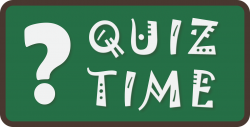 Image by Jose R. Cabello from Pixabay
Image by Jose R. Cabello from PixabayLast week’s post talked about some confusing words/word pairs/abbreviations beginning with the letter e. And here is the (fun) quiz:
1.) My grandparents (emigrated/immigrated) from Italy to the United States in 1915.
2.) (Everyone/Every one) is coming to my party tomorrow night.
3.) The (earth/Earth) revolves around the sun.
4.) I love science fiction writers, (e.g.,/i.e.,) Isaac Asimov, Arthur Clarke, and Frank Herbert.
5.) Do you exercise (everyday/every day)?
6.) His entire family is (exceedingly/excessively) tall.
7.) Many children are quite (anxious/eager) to return to school after being home for so long and will be delighted to see their friends again.
8.) Whenever I go out into the sunshine, my mood is (affected/effected) positively.
9.) The students were all very kind to (each other/eachother/one another) in the kindergarten class.
8.) My favorite class was the one where we got to cook and sew, (e.g./i.e.), home economics.
9.) Her cousin is serving a long jail sentence for (elicit/illicit) activities during his 20s.
10.) Carbs like rice, potatoes, pasta (, etc., / , etc./ etc.,) are my favorite things to eat.
11.) She tries to impress me by (alluding/eluding) to famous people she has met.
12.) The dark sky indicates to me that a storm is (eminent/imminent).
13.) (Both of them are/Each of them is) taking a separate flight from one another.
14.) I will see how things go, but I might (emigrate, immigrate) to Canada soon.
15.) I love (everyone/every one) of you.
16.) I am wearing (everyday/ every day) clothes to the luncheon.
17.) The (eminent/imminent) scientist is working on a Covid vaccine.
18.) This salsa is (exceedingly/excessively) spicy.
19.) Saturn, Jupiter, Mercury, (earth/Earth), the sun, and the moon are all heavenly bodies.
20.) The criminal has (alluded/eluded/ illuded) the police for many months.
Scroll down for the answers!
More
Keep scrolling
Almost There
1.) My grandparents (emigrated/immigrated) from Italy to the United States in 1915.
2.) (Everyone/Every one) is coming to my party tomorrow night.
3.) The (earth/Earth) revolves around the sun. (But it isn’t terrible if you uppercase it)
4.) I love science fiction writers, (e.g.,/i.e.,) Isaac Asimov, Arthur Clarke, and Frank Herbert. (for example)
5.) Do you exercise (everyday/every day)?
6.) His entire family is (exceedingly/excessively) tall.
7.) Many children are quite (anxious/eager) to return to school after being home for so long and will be delighted to see their friends again.
8.) Whenever I go out into the sunshine, my mood is (affected/effected) positively.
9.) The students were all very kind to (each other/eachother/one another) in the kindergarten class. (Either is OK; you might want to use one another because it generally refers to more than two.)
8.) My favorite class was the one where we got to cook and sew, (e.g./i.e.), home economics. (that is: cooking and sewing= home economics class.)
9.) Her cousin is serving a long jail sentence for (elicit/illicit) activities during his 20s.
10.) Carbs like rice, potatoes, pasta (, etc., / , etc./ etc.,) are my favorite things to eat. (Set off with two commas)
11.) She tries to impress me by (alluding/eluding) to famous people she has met.
12.) The dark sky indicates to me that a storm is (eminent/imminent).
13.) (Both of them are/Each of them is) taking a separate flight from one another. (Both would mean together.)
14.) I will see how things go, but I might (emigrate, immigrate) to Canada soon.
15.) I love (everyone/every one) of you.
16.) I am wearing (everyday/ every day) clothes to the luncheon.
17.) The (eminent/imminent) scientist is working on a Covid vaccine.
18.) This salsa is (exceedingly/excessively) spicy. (Either one, but meaning different things: very spicy or spicier than it has to be.)
19.) Saturn, Jupiter, Mercury, (earth/Earth), the sun, and the moon are all heavenly bodies.
20.) The criminal has (alluded/eluded/ illuded) the police for many months.
News: I am scheduled to do a teleseminar for the National Association of Memoir Writers — talking about grammar — on Friday, September 18, at 11 a.m. Pacific time. I don’t have a link yet, but you can look up their website.
August 14, 2020
It’s “E”asy: More Confusing Words
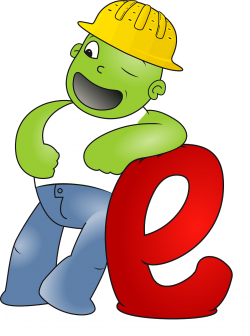 Image by OpenClipart-Vectors from Pixabay
Image by OpenClipart-Vectors from PixabayNow that we are all straightened out with lay and lie (last week’s blog post), let’s continue with confusing words/word pairs that begin with the letter E:
1). e.g/i.e – These abbreviations come from Latin, and you are always free to use the actual words rather than these abbreviations. If you do use the abbreviations, remember to put a period after each letter, and use commas before and after them.
e.g. – Exempli gratia, meaning “for example.” I did very well in the sciences in college, e.g., astronomy, chemistry, and physics.
i.e. – Id est, meaning “that is.” The shortest month of the year, i.e., February, usually has only 28 days.
2.) etc. – Etcetera is entirely different from both i.e. and e.g. and means “and the others.” It generally follows a list and can be avoided (and often should be) by just writing out all the items in the list. If you use etc., make sure you follow it with a period and put a comma before it.
I have traveled to many European countries, including France, Spain, Greece, Italy, Germany, Poland, etc.
3.) each other/one another – First, note that each other is two separate words. These two phrases are interchangeable. Some people say that each other should be used for two people, and one another should be used when referring to more than two people. However, this distinction is unnecessary and rarely used. In these examples, the distinction is made.
They really loved each other.
In this classroom, we are all kind to one another.
4.) Earth/earth – Should earth be capitalized or not? The answer is sometimes. When Earth is used along with other planets (which are capitalized) and heavenly bodies that are capitalized, it, too, is capitalized. Otherwise, it is not (sun and moon are not capitalized).
The two planets closer to the sun than Earth are Mercury and Venus.
We need to make sure that climate change does not destroy our earth.
5.) elicit/illicit – These two words have very different meanings. Also, one has a double L and the other doesn’t.
elicit (prefix e/ex meaning out) – To draw out or bring forth – She was so shy, it was difficult to elicit an answer to my question.
illicit (prefix in/il meaning not) – Not moral or lawful – The senator was sentenced to prison for his illicit business dealings.
6.) emigrate/immigrate – These words are opposite and once again, the prefix doubles the m in immigrate (and once again, we see the e prefix, meaning out).
emigrate – to leave a country: They emigrated from Ukraine to the United States.
immigrate – to go to a country – They immigrated to the United States from Ukraine.
7.) eminent/imminent – These two words have nothing to do with one another that is obvious, although they are probably opposites.
eminent – well-known or outstanding in one’s field (the e prefix meaning out, perhaps standing out) – She is an eminent virologist.
imminent – about to happen – I knew a big storm was imminent when I looked at the dark sky.
8.) every day/everyday – Every day is a noun/adjective pair. Everyday is an adjective.
every day – each day or daily – I walk two miles every day.
everyday – describes something that happens every day or regularly – Walking is an everyday activity for me.
9.) every one/everyone – Every one is an adjective/pronoun pair (usually followed by “of”); everyone is a pronoun.
every one – each of them – Every one of the children knows how to swim.
everyone – everybody – Everyone was gathered around the campfire.
10.) exceedingly/excessively – These words are both adverbs, but with different meanings.
exceedingly – very, extremely – He juggled exceedingly well for a young child.
excessively – too much, more than necessary – The students chatted excessively during silent reading time.
Stay safe. Stay well.
August 6, 2020
Lay? Lie? I Give Up!
Don’t give up.
 Image by Free-Photos from Pixabay
Image by Free-Photos from PixabayI received a request to review this tricky verb pair, so we will straighten it all out here.
Lay and lie are present tense verbs. In grammatical terms one is transitive and one is intransitive. Lay is transitive. Lie is intransitive. What does that mean?
Lay is transitive and therefore takes a direct object. What is a direct object? A noun or pronoun that receives the action of the verb.
Lie is intransitive and therefore does not take a direct object. There is no noun or pronoun right after it, although there may be some other kind of word or phrase.
In other words, you must lay something. But you don’t lie something:
Lay your head on the pillow. (Lie what? head, a noun) Lie on the sofa. (Lie what? There is no what. There is no object. There is a prepositional phrase telling where.)
More examples:
The rocks are lying on the road.
I am going to lay the rocks in a circle.
I am lying in the sun.
Please lay your purse on the table.
Okay. Now let’s move t0 the past tense, which is the problem tense. The past tense of lie is lay. The past tense of lay is laid.
The rocks were lying on the road.
I laid the rocks in a circle.
Yesterday I lay in the sun. (Or yesterday, I was lying in the sun.)
She laid her purse on the table and forgot it there.
Last, let’s go to the past participle (or present perfect tense). That is the one using “has” or “have.” The past participle of lie is lain (have lain). The past participle of lay is laid.
The rocks have lain in the same place for weeks.
I have laid the rocks in a circle around the flowers.
I have lain in the sun every afternoon and have quite a good tan.
She has always laid her purse in the same place at home, so she won’t lose it.
To sum up:
I lie in the sun. I am lying in the sun.
Yesterday I lay in the sun. Yesterday I was lying in the sun (not laying).
Every day, I have lain in the sun.
Lay your book on the table. I am laying your book on the table. I was laying your book on the table.
Yesterday I laid this book here, but it is now gone.
I have always laid this book in the same place.
LIE, LAY, HAVE LAIN
LAY, LAID, LAID
Proud to have received the bronze medal for To Comma or Not to Comma in the President’s Book Awards, Florida Authors and Publishers Association
July 31, 2020
Another Quiz? Yes, Just for You!
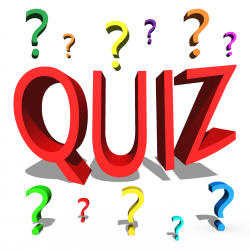 Image by Garaz from Pixabay
Image by Garaz from PixabayContinuing in our series about confusing word pairs (we will take a break next week), here is a little quiz on last week’s words – with maybe a few others thrown in.
1. We took a vacation to the (dessert, desert) in Arizona.
2. Sue quit piano lessons because she was really (disinterested, uninterested) in learning how to read music.
3. I recognized him immediately because he has a very (distinct, distinctive) face.
4. The outside light is on because it has a motion (censor, sensor).
5. I was shocked when he (dived, dove) into the lake from that high cliff.
6. Please (come, go) to my party next Saturday night.
7. Her story about the ghost seemed (credible, creditable).
8. This blue suit is quite (different from, different than) mine.
9. I plan to (cite, site, sight) some famous poets in my speech.
10. The (criteria, criterion) for getting this job is having a business degree.
11. My brother’ s new car has (dual, duel) exhaust.
12. She just got a new job as a (copyrighter, copy writer, copywriter), creating social media posts.
13. Please be very (discrete, discreet) when you talk to her because she tends to gossip.
14. Refer to the (currant, current) edition of the newsletter.
15, Was she (conscience, conscious) after the accident?
16. We (collaborated, corroborated) on the project.
17. We are going to visit the United States (Capital, Capitol) building.
18. I felt really (bad, badly) about the end of our friendship.
19. Since she finished first in regional competition, she received a (buy, by, bye) into the national competition.
20. I have three (consecutive, successive) Zoom meetings on Friday morning.
Easy Quiz, Huh???? Scroll down for the answers . . .
Scroll . . .
A little farther . . .
Almost there . . .
1. We took a vacation to the (dessert, desert) in Arizona.
2. Sue quit piano lessons because she was really (disinterested, uninterested) in learning how to read music.
3. I recognized him immediately because he has a very (distinct, distinctive) face.
4. The outside light is on because it has a motion (censor, sensor).
5. I was shocked when he (dived, dove) into the lake from that high cliff. Either one. They are interchangeable.
6. Please (come, go) to my party next Saturday night.
7. Her story about the ghost seemed (credible, creditable).
8. This blue suit is quite (different from, different than) mine.
9. I plan to (cite, site, sight) some famous poets in my speech.
10. The (criteria, criterion) for getting this job is having a business degree.
11. My brother’ s new car has (dual, duel) exhaust.
12. She just got a new job as a (copyrighter, copy writer, copywriter), creating social media posts.
13. Please be very (discrete, discreet) when you talk to her because she tends to gossip.
14. Refer to the (currant, current) edition of the newsletter.
15, Was she (conscience, conscious) after the accident?
16. We (collaborated, corroborated) on the project.
17. We are going to visit the United States (Capital, Capitol) building.
18. I felt really (bad, badly) about the end of our friendship.
19. Since she finished first in regional competition, she received a (buy, by, bye) into the national competition.
20. I have three (consecutive, successive) Zoom meetings on Friday morning. Either one. They are interchangeable.
Tomorrow there is a virtual Awards Ceremony, so I can see where I placed in the Florida Authors and Publishers Association (FAPA) book awards. I am a finalist.
Let me know (by e-mail) if you have any ideas for topics on The Grammar Diva blog.
And if you should want to write a guest post on a topic my readers would be interested it, contact me by e-mail.
Stay safe. Stay well.
July 24, 2020
More Confusing Words: C and D
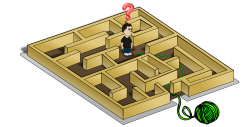 Image by Jan Helebrant from Pixabay
Image by Jan Helebrant from PixabayAnd we continue on our tour through confusing words and word pairs….today, the rest of C and all of D. Next week, the quiz. Then we will take a little break and talk about something else fun! Wow, I just wrote a bunch of sentence fragments! Refer back to the posts on A words, B words, and C words.
Ten more for you:
1 Censor/Sensor – (Yup, we already did censor/censure) To censor something is to ban it. It is generally a verb, but can be a noun. Sensor is always a noun and is a device that is sensitive to something and transmits information about that something. It is obviously related to the verb sense. The library does not like to censor any books. The motion sensor causes the light to go on whenever something or someone moves near it.
2. Cite/Site/Sight – Cite is a verb that means to mention. Site is a noun and refers to a place. Sight is a noun (or can be a verb and even an adjective), and you know what that one means. I will cite some well-known authors in my speech. The construction site is dangerous to enter. Sight is one of our five senses.
3. Come/Go – These two verbs go in opposite directions (kind of like bring and take). You come toward something, and you go away from it. He went to Europe last year (went is the past tense of go). He came home in June.
4. Conscience/Conscious – These are both tricky to spell! One has the word science at the end. Conscience is a noun, and you can have a guilty one. Conscious is an adjective that means aware of what is going on.
5. Copyright/Copy write – Besides noting the difference in meaning, note that one is two words and the other is a single word. Copyright is a noun or verb, and you get one (or do it) to protect your work. Copy write is a verb meaning to write copy. You can be a copywriter, which is one word. Copy write as the verb is not too commonly used. I always copyright my work. He wants someone to copy write the summary on the back cover of his book. He is hiring an experienced copywriter.
6. Credible/Creditable – Credible is an adjective that means believable. Creditable, also an adjective, means worthy of credit or honor. I think her alibi is credible. She has done a creditable job as a senator.
7. Desert/Dessert – Dessert with two s‘s is the sweet one (noun). Desert with one s is the dry, hot one (noun). But desert is also the verb that means to leave. I will have cake for dessert. There is no cake in the desert, nor is there water. He deserted me, and I was alone in the desert.
8. Different from/Different than – The correct phrase is different from and is used in comparison. This plant is different from that one.
9. Discreet/Discrete – Both are adjectives. If you are discreet, you won’t tell my secret to anyone. If you are separating your socks by color, you might be putting them into discrete (separate) piles according to color.
10. Disinterested/Uninterested – Yes, there is a big distinction here. Uninterested means having no interest. Disinterested means impartial. I am uninterested in most team sports. We need disinterested judges for the book contest.
Stay safe. Stay home. Wear a mask. Social distance — Unless you are in a place that has conquered the virus. I am not.
July 17, 2020
“C” This Quiz!
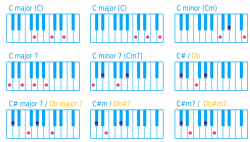 Image by 200 Degrees from Pixabay
Image by 200 Degrees from PixabayLast week’s post included some confusing “c” words. Here is a quiz on those words with a few surprises snuck in:
Several people (collaborated, corroborated) her story that she was at her friend’s house last Saturday night.
I thought the end of the movie was (anticlimactic, anticlimatic) compared to the excitement at the beginning.
We thought red roses would (complement, compliment) the white tablecloths at the wedding reception.
I love this new purse, which is made of (canvas, canvass).
We read this book in class last year, although some school districts (censored, censured, sensored) it.
There are three (consecutive, successive) workshops on Monday — 2, 3, and 4 p.m.
The class is (composed, comprised) of music theory, music history, and music practice.
My brother and I have several (common, mutual) friends.
Try this sandpaper; it is (coarser, courser) than the kind you are using.
Names of cities and states begin with a (capital, capitol) letter.
The nonstop banging has gone on (continually, continuously) for four hours.
The (contingent, contingency) included all three school bands.
Here are the three (criteria, criterion) necessary to qualify for the job.
Is this the (currant, current) edition of the magazine?
If only I (could have, could of) taken the exam over again!
I have (continually continuously) failed the Constitution Exam, which I have taken four times!
The only (criteria, criterion) is that you show up at 9 a.m. sharp.
Forty-five students (compose, comprise) the senior jazz band.
Boston is the (capital, capitol) of Massachusetts.
The Board of Directors (censored, censured) the member for plagiarizing her speech.
Scroll down for the answers, please.
More…
More…
Several people (collaborated, corroborated ) her story that she was at her friend’s house last Saturday night.
I thought the end of the movie was ( anticlimactic, anticlimatic) compared to the excitement at the beginning.
We thought red roses would ( complement , compliment) the white tablecloths at the wedding reception.
I love this new purse, which is made of ( canvas , canvass).
We read this book in class last year, although some school districts ( censored , censured, sensored) it.
There are three ( consecutive, successive) workshops on Monday — 2, 3, and 4 p.m. (Either is correct; the words are interchangeable.)
The class is ( composed , comprised) of music theory, music history, and music practice.
My brother and I have several ( common, mutual) friends.
Try this sandpaper; it is ( coarser, courser) than the kind you are using.
Names of cities and states begin with a ( capital, capitol) letter.
The nonstop banging has gone on (continually, continuously ) for four hours.
The ( contingent , contingency) included all three school bands.
Here are the three ( criteria , criterion) necessary to qualify for the job.
Is this the (currant, current ) edition of the magazine?
If only I ( could have , could of) taken the exam over again!
I have ( continually , continuously) failed the Constitution Exam, which I have taken four times!
The only (criteria, criterion ) is that you show up at 9 a.m. sharp.
Forty-five students (compose, comprise) the senior jazz band.
Boston is the ( capital, capitol) of Massachusetts.
The Board of Directors (censored, censured ) the member for plagiarizing her speech.
Questions? Refer back to last week’s post for most of the words.
July 9, 2020
“C” These Confusing Words!
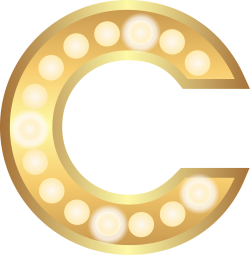 Image by Oberholster Venita from Pixabay
Image by Oberholster Venita from PixabaySo, is it capital or capitol? What is the difference between censor and censure? Here we go with the third installment of confusing words and word pairs:
1 Capital/Capitol:
Capitol refers only to the actual Capitol building. But Boston is the capital of Massachusetts. Massachusetts begins with a capital M.
2. Canvas/Canvass:
My sneakers are made of canvas. And when I put them on to go door-to-door with a survey, I will canvass the neighborhood.
3. Censor/Censure:
Censor is a verb. Censure is a noun. I will censor all curse words from my radio broadcast (bleep!). Censure is a strong, often official, reprimand: The Senate committee censured the President for his actions.
4. Climactic/Climatic:
Climactic with the second c comes from climax: The car chase was the climactic point of the movie. Climatic comes from climate. The report give the climatic forecast for June.
5. Clothes/ Cloths:
If you wear cloths, you might look funny, as usually you use them for dusting. If you wear clothes, you will looked dressed.
6.Collaborate/Corroborate:
These two words are quite different in meaning. To collaborate means to work together, such as collaborating on a project. To corroborate means to confirm or make more certain, such as corroborating someone’s alibi that they were not in town on the night of the robbery.
7. Common/Mutual:
Common means shared: My sister and I have several friends in common. Mutual means reciprocal: My sister and I have mutual admiration for each other although we are very different.
8, Complement/Compliment:
If I tell you your shoes are nice, that is a compliment with an i. But if I tell you that your shirt complements your eyes, I mean that they go well together, and I use an e.
9.Compose/Comprise: Ugh – this one is so confusing.
The parts comprise the whole: Fifty states comprise the United States. The whole is composed of the parts: The United States is composed of 50 states. (Not is comprised of)
10. Continual/Continuous: There is no longer much regard for the difference between these two adjectives.
Continual means over and over again, often in rapid succession. Continuous means without stopping. These continual thunderstorms make every day gloomy. It rained continuously all day.
Hope you are staying well in this pandemic. Wear a mask, please.
July 3, 2020
A Little Quiz on Confusing “B” Words
 Image by Gerd Altmann from Pixabay
Image by Gerd Altmann from PixabayA couple of weeks ago, I continued the series of posts on confusing words with B words. But don’t look back until after you take this little quiz! Scroll down for the answers.
The (bimonthly, semimonthly) newsletter comes out the second and fourth weeks of every month.
She felt (bad, badly) about breaking the plate, but I told her it wasn’t worth much.
She has (born, borne) eight children in ten years!
His fears of heights is (because of, due to) falling out of a tree as a child.
It was my first time sleeping on a (berth, birth) on a train.
Could you please (bring, take) these groceries over to Grandma’s house?
There is no one in the house (beside, besides) me.
That is a really (bazaar, bizarre) story you told me.
I am waiting with (baited, bated) breath to hear the end of that story!
(Both, Each) of you should take a cookie.
Because she was a top athlete, she got a (buy, by, bye) into the semifinals.
That is certainly a tough (break, brake) you had.
I told her the secret (by accident, on accident) when we were talking about Jill.
Most of the Miss America contestants were (blond, blonde) last time I watched.
I performed really (bad, badly) on the quiz.
Every two years we have a (semiannual, biennial) celebration.
I used to be very (board, bored, borde) in math class.
The little girl enjoyed (baiting, bating) the fishing hook.
He sat (beside, besides) me in school every class.
I can’t go to the conference (because of, due to) conflicting plans I made.
Scroll down for the answers:
More . . .
More . . .
More . . .
More . . .
More . . .
Again . . .
One more time . . .
The (bimonthly, semimonthly) newsletter comes out the second and fourth weeks of every month.
She felt (bad, badly) about breaking the plate, but I told her it wasn’t worth much.
She has (born, borne) eight children in ten years!
His fears of heights is (because of, due to) falling out of a tree as a child.
It was my first time sleeping on a (berth, birth) on a train.
Could you please (bring, take) these groceries over to Grandma’s house?
There is no one in the house (beside, besides) me.
That is a really (bazaar, bizarre) story you told me.
I am waiting with (baited, bated) breath to hear the end of that story!
(Both, Each) of you should take a cookie.
Because she was a top athlete, she got a (buy, by, bye) into the semifinals.
That is certainly a tough (break, brake) you had.
I told her the secret (by accident, on accident) when we were talking about Jill.
Most of the Miss America contestants were (blond, blonde) last time I watched.
I performed really (bad, badly) on the quiz.
Every two years we have a (semiannual, biennial) celebration.
I used to be very (board, bored, borde) in math class.
The little girl enjoyed (baiting, bating) the fishing hook.
He sat (beside, besides) me in school every class.
I can’t go to the conference (because of, due to) conflicting plans I made.
In case you missed the teleseminar and would like to listen, here is my grammar talk with Stephanie Chandler, CEO of the Nonfiction Writers Association:
http://bigwords101.com/wp-content/uploads/2020/07/Stephanie-Chandler-teleseminiar-7-1-20.mp3
June 25, 2020
Possessives Before Gerunds: Best of the Grammar Diva
 Image by skeeze from Pixabay
Image by skeeze from PixabayThis post was originally published June 1, 2013, in the early days of this blog. I was going to publish a new blog this week — a test on the confused words of last week –but I am in the process of moving and too tired to write a new post… so that will be next week!
So for now, enjoy this post:
————————————————————————————-
Which one of these sentences are you most likely to say?
“I hope you don’t mind me borrowing your car.” Or
“I hope you don’t mind my borrowing your car.”
Notice that the only difference is me versus my. My is the possessive form of the pronoun I or me. For example, “my book” and “my idea” are possessives. The book and the idea belong to me.
The second example is correct—the sentence that uses the possessive my. Why? Because you use a possessive before a gerund, and borrowing is a gerund.
Let me explain. A gerund is a word that used to be a verb (action) and is now being used as a noun, or thing. Nouns are used as subjects and objects in sentences. Gerunds end in -ing.
We are swimming in the pool. In this sentence, are swimming is the verb, or action. (By the way, the are helps determine the tense and is called a helping verb.)
Swimming relaxes me. In this sentence, relaxes is the verb, or action word. Swimming is the subject of the sentence, or the thing performing the action (relaxes). You can tell swimming is a noun because you can substitute other nouns here and the sentence makes sense. For example: Chocolate relaxes me. In this sentence, chocolate is a noun and is the subject.
When you use a noun or pronoun before a gerund, that noun or pronoun should be possessive. Here are some examples:
Your swimming is really improving.
I enjoy your singing.(I is the subject, enjoy is the verb, and singing is the object and a gerund.)
I don’t like my son’s riding a bicycle without a helmet.
I am punishing you for your eating in the computer room.
OK. But now we hit a snag (of course).
There are some other words that look like gerunds—in other words, they used to be verbs, are not being used as verbs, and end in -ing. But instead of functioning as nouns, they are functioning as adjectives (which describe nouns). They are called participles. Here are some examples of participles:
I know the woman wearing the hat. (Wearing describes woman. Which woman? The one wearing a hat.)
I hear you singing in the shower. (Singing is an adjective describing you. I hear you. You are singing in the shower.)
There is a bunny hopping in the back yard. (Hopping describes bunny. Hopping bunny.)
See if you can tell which is a gerund and which is a participle:
I see the cat chasing its tail.
Chasing its tail is fun for the cat.
Chasing is a gerund (or noun) in the second sentence. It is the subject of the sentence and a noun. In the first sentence, chasing is a participle (or adjective) describing the cat.
RULE: Use the possessive before a gerund, but not a participle.
Examples:
I know the woman wearing a hat. In this sentence, wearing describes the woman. It is the woman whom you know. Which woman? The one wearing a hat. The focus here is on the woman, the noun. Wearing the hat simply tells which woman.
I don’t like the woman’s wearing a hat inside the house. In this sentence, the focus is on the wearing. It is the wearing you don’t like. The wearing belongs to the woman. It’s not the woman you don’t like. Here, wearing is a noun, or gerund, and you use the possessive (woman’s).
Here are a few more examples to (hopefully) make this a little clearer.
I know his reading every night has helped him pass the test. (possessive and gerund – focus is on reading)
I see him reading in the library every evening. (reading, a participle, describes him – focus is on him)
I hope you don’t mind my staying with you next week. (possessive and gerund – focus on staying)
I hear you calling my name. (calling, a participle, describes you – focus on you)
As you can see, there is sometimes a fine line between the two, so do the best you can!! And let me know if you have any questions, please!
Please check out my teleseminar as I talk with Stephanie Chandler, president of the Nonfiction Writers Association!

